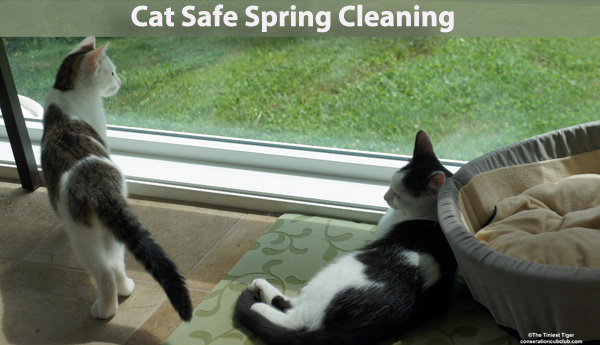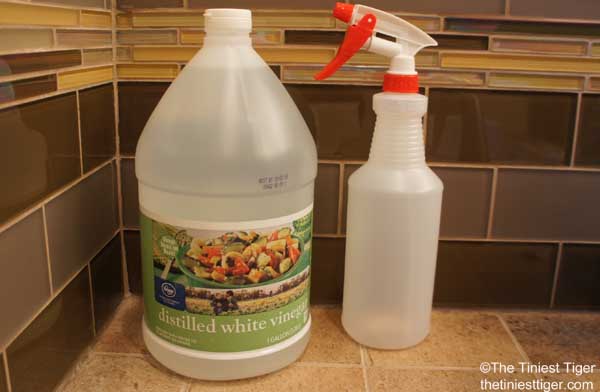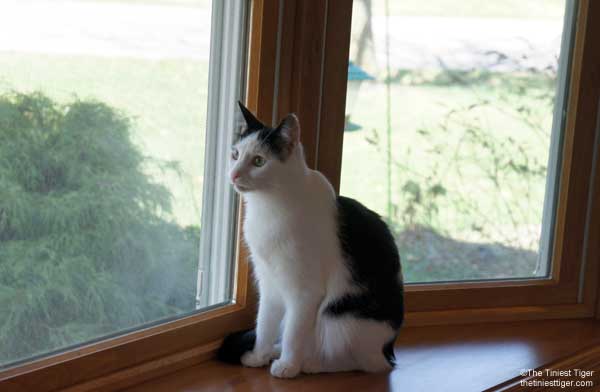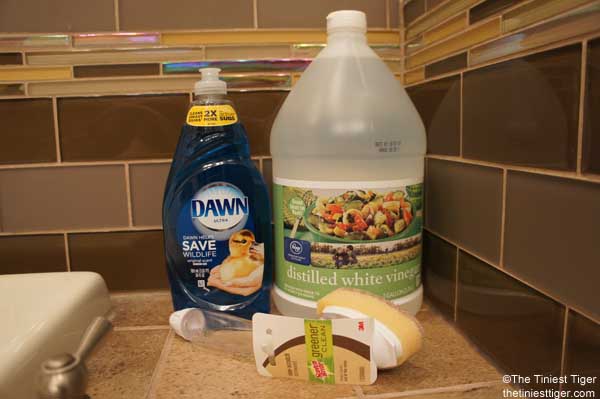Is Vinegar is safe for cats
Is vinegar is safe for cats? Yes, even for cleaning the sunroom, our cats’ favorite room in the house. A friend who visited recently commented that our sunroom looked like a cats equivalent of a child daycare recreation room. The sunroom has the Cat Power Tower along with scratching posts, soft beds for sleeping and many of their favorite toys. There is also a sofa and love-seat for us. With all this action, you can imagine we need to keep the sunroom clean and refreshed.
This room has large screened windows perfect for bird and wildlife watching but the glass windows need to be cleaned not only to wipe off cat nose smudges and paw prints but also to help keep spiders and other insects out of the room.
A Cat Safe Cleaning Guide
We only use cat safe cleaning supplies for Spring-cleaning and year round. These non-toxic solutions work great, smell fresh and clean and are often less expensive than chemical cleaners.
Vinegar, specifically household vinegar with 2.5% to 5% acetic acid, can be a safe and effective cleaning solution for surfaces in feline environments such as veterinary practices, shelters, and households. When used undiluted or diluted with water, vinegar can remove stains, dirt, and grime. However, it is essential to rinse cleaned surfaces thoroughly with water to remove any lingering vinegar residue, as cats can be sensitive to the smell of vinegar.
Keeping Spiders and Insects Away
To help keep the spiders away and your cats safe too, use a mix of half white vinegar and half water. You can use a spray bottle or a bucket to apply the vinegar and water solution to the windowsills. We use a rag to wipe clean all the dirt and debris that has accumulated over the winter. This leaves our windowsills clean and inviting to us, but a natural repellent for spiders.
Clean Screens and Windows
We spray the screens with the 50/50 vinegar -water solution. Then from the outside use a hose to rinse off the screens. When the windows are dry we clean the glass with a solution of 1/4 cup rubbing alcohol and 1/3 cup vinegar and water in a 32 ounce spray bottle. We spray this solution onto a lint free cloth and the result is streak-free clean windows.
Cat Safe Clean Floors
For the tile floor we use our Bissell Symphony All-in-One Vacuum & Steam Mop. This great machine vacuums and steams clean at the same time! This lightweight handy tool is one that I use almost every single day. It is convenient not only for the sunroom but for the keeping the kitchen floor clean and cat safe.
Once we get started Spring-cleaning one area of the house, we just keep going. When we see the clean and clear sunroom windows, we realize that the other windows in the house need a good cleaning too.
Cat Safe Clean Bathroom
Another room that we like to keep super clean is the bathroom. We try to keep the cats out of the master bathroom. Try….to keep them out but Annie wants to be a lifeguard while we shower and Eddie likes to spend the mornings with Paul so we opted for a cat safe clean bathroom too.
Cat Safe Dawn & Vinegar Cleaning Solution
We use a solution of Dawn dish detergent and distilled white vinegar. We have used this solution for the last year and our glass shower stays clean and clear. The soap scum just washes away.
Ingredients:
- 1 part Dawn liquid (1 1/2 cups)
- 1 part white vinegar (1 1/2 cups)
- 1 spray bottle and/or one fillable scrub brush.
Preparation:
- Heat 1 1/2 cups vinegar in the microwave for 2 minutes.
- Pour vinegar into spray bottle.
- Add 1 1/2 cups liquid Dawn to spray bottle.
- Shake well.
We keep the solutions on hand and use after showering. Simply spray on the glass and tile surfaces and rinse the solution off with the shower wand. We keep a squeegee in the shower to wipe down after rinsing. There is a strong vinegar smell that dissipates quickly, so you might want to keep your exhaust fan running or open a window if this smell bothers you. This keeps our shower, bathtub and sinks clean without the harsh chemicals.
Flea Treatment
Apple cider vinegar, which contains roughly 5 percent acetic acid, can serve as a natural flea treatment for cats by creating an acidic environment that is unfavorable for fleas. Diluting apple cider vinegar with an equal amount of water and spraying it on a cat’s coat can help to repel fleas. This method is generally considered safe, but it is critical to avoid contact with the cat’s eyes, nose, and mouth, as it may cause irritation.
Keep in mind that while vinegar can provide some benefits for cats, it is important to consult with a veterinarian before implementing any new treatments or cleaning methods involving vinegar to ensure the safety and wellbeing of your feline companions.
Is Vinegar Safe for Cats? Exploring the Facts and Risks
Vinegar is a common household item that is often used for cleaning and cooking purposes. As cat parents, it’s important to consider the safety of any substance around our pets. We explore whether vinegar is safe for cats, the potential risks associated with its use, and alternative solutions for cat owners.
Cats, like any other animals, can have sensitivities to various substances, and it is essential to understand how these substances might interact with feline physiology. Vinegar, a weak acid typically made through the fermentation process, possesses certain properties that could be potentially harmful to cats if ingested or applied topically. Conversely, there may also be situations in which vinegar is useful for treating specific health conditions in cats.
When considering the use of vinegar with cats, it is crucial to weigh the potential benefits against the risks and to consult with a veterinarian for professional guidance. Ultimately, responsible pet ownership means taking all necessary precautions to ensure the safety and well-being of our beloved feline companions.
Key Takeaways
- Vinegar’s safety for cats depends on various factors, such as ingestion or topical use.
- Potential health impacts must be weighed against potential benefits in treating specific conditions.
- Always consult with a veterinarian before using vinegar for your cat’s care.
Understanding Cats and Vinegar
Cats possess unique metabolic idiosyncrasies that make them more sensitive to certain substances than other animals. One such example is their lack of the enzyme UDP-glucuronosyltransferase, which makes them susceptible to toxic effects from some disinfectants commonly used in household cleaning.
Vinegar is a popular choice for cleaning and disinfecting surfaces due to its natural acidity and antibacterial properties. While it is an effective and eco-friendly option, the safety of using vinegar around cats may be a concern for pet owners.
In general, diluted vinegar is considered safe for cats. A solution made of equal parts water and white vinegar can be used to clean surfaces that your cat comes into contact with, such as countertops, floors, and litter boxes. However, it is important to ensure that the area is properly ventilated, as the vinegar’s strong smell can be overwhelming for both humans and cats.
Despite its relative safety, there are a few precautions cat owners should take when using vinegar:
- Always dilute vinegar with water before using it around cats.
- Avoid using vinegar to clean your cat’s toys or bedding, as the strong smell may deter them from using those items.
- It is best to keep cats away from the area while cleaning with vinegar to minimize their exposure to the smell, and to let the surfaces dry completely before allowing your cat to return.
- Ingestion of vinegar, even in small amounts, can cause gastrointestinal irritation and vomiting in cats. So, it is crucial to ensure that your pet does not have access to undiluted vinegar or cleaning solutions containing vinegar.
By taking these precautions, cat owners can confidently use vinegar as a safer cleaning alternative while ensuring their feline companion’s safety and comfort.
Chemical Composition of Vinegar
Vinegar is a liquid product that is commonly used in cooking and cleaning. It is an aqueous solution of acetic acid that contains a variety of organic compounds, minerals, and trace elements. The primary component of vinegar is acetic acid (CH3COOH), which typically accounts for 4-8% of its composition. Other components include water, trace minerals, and organic acids such as lactic, citric, and malic acids.
There are several types of vinegar, each produced through different fermentation processes and using different raw materials. For instance, apple cider vinegar is made from fermented apple juice, while white vinegar is derived from grain-based ethanol. Consequently, the chemical composition and concentration of acetic acid in different vinegars can vary.
Notably, the low pH value of vinegar is responsible for its antimicrobial and cleaning properties. The acidity of vinegar typically ranges between 2.4 and 3.5, depending on its source and production method.
In summary, vinegar is primarily composed of acetic acid and water, with additional organic acids and trace elements present in varying amounts depending on the type of vinegar. Its low pH value contributes to its antimicrobial and cleaning properties.
Health Impacts of Vinegar on Cats
Vinegar, specifically apple cider vinegar, is known for its various health benefits in humans. However, when it comes to cats, caution must be taken as their metabolism is different from ours. While small amounts of vinegar may not cause immediate harm to cats, it is not recommended as a regular supplement for felines.
One positive aspect of vinegar for cats is its potential use as a natural flea repellent. Diluting apple cider vinegar with water and spraying it on a cat’s fur might help deter fleas from infesting the animal. However, it is essential to remember that the vinegar should be heavily diluted, as undiluted or heavily concentrated vinegar could irritate a cat’s skin.
On the other hand, excessive consumption of vinegar, especially in its undiluted form, could pose risks to cats. Its acidity might lead to digestive issues, such as stomach upset or discomfort. Additionally, the high acid content in vinegar could also cause acidic blood levels in cats, which might further lead to other health complications.
It is worth noting that the antioxidant and lipid-lowering properties of vinegar mentioned in the search results refer to the effects observed in human or cell studies. These findings cannot be directly applied to cats due to differences in metabolism and the way their bodies process substances.
In conclusion, while vinegar might provide some benefits, such as flea repellent, it should not be introduced into a cat’s diet without proper consultation from a veterinarian. Always prioritize your cat’s safety and well-being by seeking professional advice before trying any new or alternative treatments.
Potential Risks of Vinegar for Cats
Acidity
Vinegar, particularly apple cider vinegar, is known for its acidity as it consists of roughly 5% acetic acid. While this acidity can have health benefits for humans, it may pose potential risks for cats. Cats have a more sensitive digestive system compared to humans, and ingesting a high concentration of acidic substances like vinegar can lead to adverse effects on their health. Symptoms like vomiting, diarrhea, or stomach upset may occur in cats if they ingest vinegar. Additionally, it is essential to keep vinegar away from your cats’ eyes and skin, as it can cause irritation and discomfort.
is vinegar toxic to cats?
Cats are more susceptible to toxicity from certain substances compared to other animals. Vinegars, in general, are considered safe for human consumption but could be harmful to your feline friends in large quantities. While hawthorn vinegar has been studied for its antioxidant effects, there is still limited information on how different fruit vinegars affect cats. To avoid the risk of potential toxicity, it is recommended to err on the side of caution and keep vinegar out of your cat’s reach.
Digestive Issues
Cats have specific dietary requirements and are obligate carnivores, which means they primarily require protein-rich foods sourced from animal meat. Introducing vinegar into your cat’s diet could disrupt their digestive system, causing gastrointestinal issues. Common symptoms of digestive problems in cats include diarrhea, vomiting, constipation, and loss of appetite.
It is a good idea to be cautious with the use of vinegar around your cats. The acidity, potential toxicity, and digestive issues associated with vinegar may adversely affect your kitty. Always prioritize your cat’s dietary needs, and consult with a veterinarian before introducing any new substances or foods into their diet.
Alternatives to Vinegar for Cats
While vinegar can be beneficial for certain human uses, it may not be safe for cats. In this section, we will explore some alternatives to vinegar for cleaning and disinfecting purposes around our feline friends.
Lemon and Water Solution: A non-toxic and natural alternative to vinegar is a lemon and water solution. Mix equal parts lemon juice and water in a spray bottle. This mixture has antibacterial properties and can be used for cleaning surfaces and odor control without posing a risk to your cat.
Baking Soda: Baking soda is another safe and natural option for neutralizing odors and cleaning. It can be sprinkled on carpets, upholstery, and litter boxes to absorb unwanted smells. You can also create a paste with water to scrub surfaces without harming your cat.
Mild Dish Soap: Using mild dish soap with warm water is a gentle way to clean surfaces around your home. This mixture can be safely used to clean cat dishes, toys, and bedding without causing any harm to your pet.
Consulting a Vet
It is crucial to consult a veterinarian before using vinegar on or around your cat. While some sources may suggest that vinegar is safe for pets, it is always better to seek professional advice to ensure your cat’s safety. Veterinarians are knowledgeable about potential hazards and benefits that certain substances, like vinegar, may pose to your feline companion.
Veterinarians can offer guidance on how to use vinegar safely if it is indeed appropriate for your particular cat. They may advise diluting the vinegar to a specific concentration or providing detailed instructions on the application process. Additionally, a vet can inform you of alternative options if vinegar is not suitable for your cat’s needs.
Remember, cats have sensitive skin and systems, so the use of vinegar may cause irritation or discomfort in some cases. Consulting a vet is the best way to obtain accurate information tailored to your cat’s specific needs and circumstances.
Frequently Asked Questions
Can vinegar be harmful to cats?
Vinegar, in small amounts, is generally considered safe for cats. However, excessive exposure to vinegar can be harmful as it may cause irritation to the eyes, skin, and respiratory tract. Always ensure that you use vinegar cautiously around your cat to prevent any adverse reactions.
Is it safe to use vinegar for flea treatment?
Vinegar is a natural remedy sometimes used to get rid of fleas, but it is not a reliable treatment for eliminating fleas in cats. Flea treatments specifically formulated for use on cats are recommended for effective and safe results. Consult your veterinarian for an appropriate treatment plan if your cat is suffering from a flea infestation.
Is vinegar smell dangerous for felines?
The smell of vinegar is usually not dangerous for cats. However, it can be unpleasant and cause temporary discomfort. Cats have a strong sense of smell, and the strong odor of vinegar might be overpowering for them. Make sure to use vinegar in a well-ventilated area and avoid excessively exposing your cat to the smell.
Can white vinegar be applied on cats?
White vinegar should not be directly applied to your cat’s skin or fur. It can cause irritation, dryness, and discomfort. Instead, look for appropriate and safe grooming products specially formulated for cats.
Is vinegar a suitable cat repellent?
Vinegar can act as a natural cat repellent due to its strong and unpleasant smell. However, it may not be the most suitable solution as it can cause discomfort for your cat and other animals. There are other commercially available, specially designed cat repellents that can be more effective and less irritating. Using behavior modification techniques, such as training and positive reinforcement, is also a recommended approach.
Are there risks if my cat ingests vinegar?
Ingestion of small amounts of vinegar shouldn’t cause severe health problems for your cat. However, if your cat ingests a large amount of vinegar, it could cause stomach upset, vomiting, or diarrhea. In any case of possible ingestion, it is essential to monitor your cat closely and contact your veterinarian for further guidance.




Thanks for the post. I am always looking for a safer way to clean.
Sue B